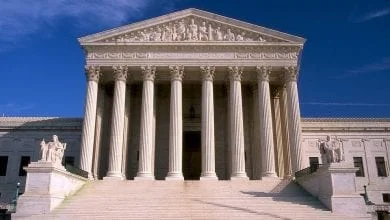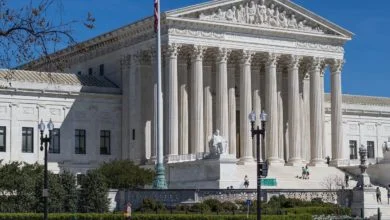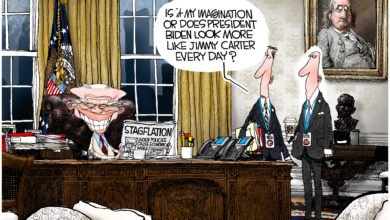‘Best Imaginable First Amendment Case’: Legal Experts Throw Cold Water On Judges’ Attempts To Silence Trump

Former President Donald Trump may retain the ability to openly discuss the cases in which he is a defendant regardless of the restrictions judges have imposed on him, legal experts told the Daily Caller News Foundation.
Trump is facing four indictments, including in Georgia and Washington, D.C., pertaining to alleged 2020 election crimes, where judges have placed restrictions on his speech regarding the cases. However, it will be difficult to enforce the ordered limitations due to Trump’s presidential candidacy, as well as his relationships with the individuals involved in the cases, legal experts told the DCNF.
“The fact that he’s a presidential candidate absolutely gives him enhanced First Amendment protections,” Article III Project founder Mike Davis told the DCNF. “This is core political speech.”
Fulton County Superior Court Judge Scott McAfee issued an order on August 21 prohibiting the former president from engaging in any acts of “intimidation,” whether through direct or indirect means, aimed at witnesses and other parties associated with the Georgia case, according to a court document. The order includes Trump’s social media posts and even his reposts of other people’s content. Moreover, Trump cannot communicate directly about the facts of the case with any co-defendant except through legal counsel.
Additionally, U.S. District Judge Tanya Chutkan issued a protective order on August 11 to restrict Trump’s speech about “sensitive materials” in the Washington, D.C. indictment for his conduct related to the 2020 election. “Sensitive materials” often include witness interviews and recordings of conversations.
”While no judge is spoiling for a fight with Trump, judges cannot let defendants flout orders or the justice system is compromised,” Joan Meyer, partner at the law firm Thompson Hine LLP, told the DCNF. “Trump is not above the law and if he tries to test that too aggressively, he may find himself in violation.”
However, Trump’s candidacy grants him significant leeway to speak out, founding professor of Nova Southeastern University Law Center Bruce Rogow told the DCNF.
“Trump of course is in a unique situation and he can, as a candidate, rail against the prosecution generally and he will not be sanctioned,” Rogow told the DCNF.
Trump has frequently characterized the prosecutions against him as a “witch hunt” and framed himself as a martyr who is facing persecution on behalf of the American people, according to The New York Times. Therefore, discussing them is a crucial component of his campaign, Rogow told the DCNF.
“Indeed, the prosecution is an important part of his political performance as a candidate, so while most defendants would be careful not to antagonize the court, the prosecutors, he will find that useful,” he said.
Trump “has the best imaginable First Amendment case for talking about the charges against him, the evidence against him, the witnesses against him,” Kenneth White, a former federal prosecutor, told The Washington Post.
Additionally, the fact that one of the witnesses is former Vice President Mike Pence, who is competing against Trump for the Republican party’s nomination for president of the United States, complicates the enforcement of the restrictions, Meyer told the DCNF.
“Where it gets problematic for a court to enforce would be comments that Trump may make about his rival, Pence, or his posts claiming that charges against him are orchestrated retaliatory actions by the Democratic Party,” Meyer told the DCNF. “If he has a colorable claim that his statements are a fair commentary about the presidential race and the quality of the candidate he is criticizing, he won’t be in violation of a court order.”
Chutkan, however, suggested she may not interpret Trump’s speech protections the same way.
“The existence of a political campaign is not going to have any bearing on my decision other than, you know, any other lawyer coming before me saying that my client needs to be able to do his job,” the judge stated at a hearing on August 11, according to the Post. “I will always, obviously, factor it in, but I intend to keep politics out of this.”
“It will take an awful lot for Judge Chutkan to jail Trump, and you can bet he will push the line as far as he can,” University of Michigan law professor Barbara McQuade told the Post. “It is a win-win situation for him. If he is not gagged and jailed, he can disparage prosecutors and witnesses with impunity. If he is jailed, he can portray himself as a victim of persecution.”
Davis agreed jailing Trump could benefit him politically.
“It would put him back in the White House,” he told the DCNF.
Chutkan has been harsh in ruling on Jan. 6 Capitol riot cases, according to The Associated Press. Trump referred to her as “highly partisan” and “VERY BIASED & UNFAIR” in a Truth Social post.
“Making truthful statements about judges should be encouraged,” Davis told the DCNF. “We have to make sure criminal defendants get fair trials.”
However, counsel for Lewis Baach Kaufmann Middlemiss Marc Frazier Scholl disagreed that Trump’s candidacy grants him extra freedom.
“Trump’s status as a presidential candidate provides him with no enhanced First Amendment freedom of expression rights,” Scholl told the DCNF. “At least I have seen no precedent that grants a presidential candidate enhanced First Amendment freedom of expression rights. That means his right to speak and express is neither enhanced nor diminished by the fact that he wishes to seek political office.”
The Department of Justice declined to comment.
The Trump campaign did not respond to the Daily Caller News Foundation’s request for comment.
Content created by The Daily Caller News Foundation is available without charge to any eligible news publisher that can provide a large audience. For licensing opportunities of our original content, please contact licensing@dailycallernewsfoundation.org




